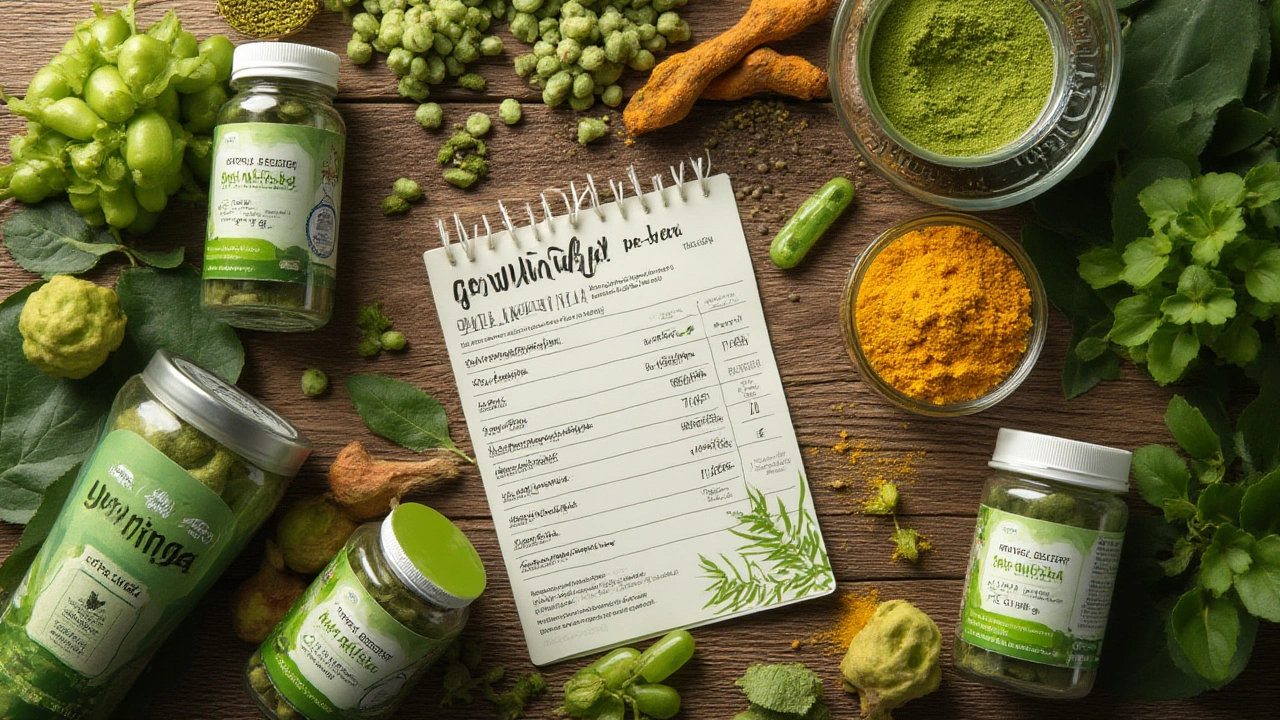If you’ve noticed green smoothies suddenly looking a little richer, there’s a good chance moringa is responsible. Here in Durban’s crowded weekend markets, stalls bristle with packets of ochre-green powder, teas, and even moringa snacks. But the real buzz? Moringa’s not just a health fad; it’s a nutritional powerhouse with roots deep in African soil. When granny says she’s swapping her iron pills for moringa leaves, you know something big is happening.
What Is Moringa and Why All the Hype?
Let’s get straight to the point. Moringa oleifera, sometimes called the “miracle tree,” isn’t new on the continent. For centuries, locals have plucked its leaves and pods, using them for everything from boosting immunity to soothing sore muscles. What’s changed is modern science catching up to what traditional healers have known for ages: moringa packs serious nutritional punch.
If you grab a handful of fresh moringa leaves, you’ll get a burst of vitamins and minerals. A single cup delivers twice the iron of spinach, seven times more vitamin C than oranges, and loads of vitamin A. That’s just the leaves — the seeds and pods are also edible, though the leaves tend to feature in most supplements you’ll find on shelves today.
Here’s a neat fact: moringa’s protein content can rival eggs. That’s good news if you’re vegetarian or just trying to get more plant-based protein. And while spirulina or chlorella sound flashy, moringa holds its own with antioxidants, including quercetin and chlorogenic acid, that fight cell damage from daily stress and pollution.
But the real reason people from North Beach to Soweto are adding moringa to their smoothies? It’s convenient. The powder stirs into water, sprinkle over oats or even bake into muffins without a bitter aftertaste. No wild preparation needed.
For those keen on hard numbers, check out what 100 grams of fresh moringa leaves gives you compared to some everyday foods:
| Food | Vitamin C (mg) | Calcium (mg) | Potassium (mg) | Protein (g) |
|---|---|---|---|---|
| Moringa leaves | 220 | 440 | 259 | 9.4 |
| Spinach | 28 | 99 | 558 | 2.9 |
| Orange | 53 | 40 | 181 | 0.9 |
Moringa comes out way ahead in calcium and protein, and even Vitamin C. It’s not magic – it’s just, well, backed by good data. No lab coats required.
So why’s the hype so intense right now? Social media plays a big role. Influencers snap pics of moringa lattes, local fitness groups in Durban share recipes for moringa-topped salads, and even a few rugby teams are adding it to shakes for muscle recovery. What’s happening is a blend of old wisdom and new convenience — and people love that combo.
The Top Health Benefits Backed by Science
The list of things moringa supposedly helps with can sound almost too good to be true. So what’s proven and what’s just wishful thinking? Let’s separate the science from the sales pitch.
The big one: immune support. Moringa isn’t a magic shield, but the vitamins (especially Vitamin C and A) give your body the stuff it needs to make white blood cells and antibodies, which are crucial if you want to dodge whatever cold’s making its way around the office.
Now, people with diabetes perk up at moringa for another reason. A real, peer-reviewed study at the University of the Free State ran a test with moringa powder and saw fasting blood sugar drop by an average of 15% in just two months. Nothing replaces your doctor’s advice or your meds, but adding moringa can aid your fight if you’re dealing with blood glucose swings.
Cholesterol? Moringa may help here too. Components in the leaves closely mimic the effects of statins (the drugs doctors use for cholesterol) but without some of the side effects. Early results in both local and international research show LDL (bad) cholesterol reductions after steady moringa consumption.
If you care about inflammation — and most of us do, since it’s at the root of everything from joint pain to heart issues — moringa gets another big tick. Its isothiocyanates (there’s a tongue-twister for you) are natural anti-inflammatories. That’s why folks with arthritis or exercise-induced soreness swear their post-workout shakes help them recover faster if they add just a teaspoon.
And it doesn’t stop there. Moringa is loaded with antioxidants. These fight oxidative stress, which, put simply, happens every time you overdo it at work or skimp on sleep. Consistent antioxidants in your diet are linked to lower risks of chronic issues like cancer, Alzheimer’s, and high blood pressure.
Many women use moringa during breastfeeding, and for good reason: a clinical trial at Tygerberg Hospital showed mothers who took moringa had a notable boost in milk production compared to those who didn’t. This makes moringa a regular pick at health clinics in both urban and rural parts of South Africa.
But don’t buy into the hype that moringa will cure everything. There’s no proof it’ll make you lose weight overnight or prevent every disease. What we do know is that it’s a solid, consistent way to nudge your nutrition in the right direction, with a heap of side benefits if you stick with it.

How to Use Moringa – Tips for Everyday Life
The cool thing about moringa? It’s easy. No complicated recipes or hours of prep. Here’s how you can make it a part of your routine without feeling like you’re taking “medicine.”
Most people start with the powder. It dissolves in warm water (not boiling, that zaps the vitamins) for a super-quick morning shot. But don’t stop there. In Durban’s neighborhoods, I’ve seen grandmothers brew up moringa in chicken stew, young execs stir it into their muesli, and gym junkies add it to post-workout smoothies for the boost. Try mixing it into yogurt, hummus, or even your favorite salad dressing. There’s almost no limit.
If you’re aiming for something more traditional, moringa leaves can be cooked up as you would spinach, tossed into curries or even baked into breads. The taste is earthy but not at all overpowering. One of my aunts makes a killer moringa pesto, blending the leaves with cashew nuts and olive oil.
Here are a few simple tricks to get the most out of your moringa:
- Start small. Half a teaspoon is plenty for beginners. Watch out for any tummy issues, though most folks handle moringa just fine.
- Store the powder in an airtight jar away from sunlight — you want those vitamins fresh, not faded.
- If buying fresh leaves, give them a quick rinse and add to meals right before serving to keep their nutrients.
- If you’re mixing with juices, go for citrus (orange, lemon, naartjie) to help with iron absorption.
- Try roasting moringa seeds and eating them as a snack — a common street food up north, mildly nutty and crunchy.
While you’re at it, keep things balanced. You don’t need to drown every meal in green powder. Use moringa as part of a varied diet. It’s a supplement, not a miracle cure. And if you’re pregnant or on any medications, check with your doc first. Moringa’s powerful, but it still deserves respect.
Where to Buy and What to Look Out For
You’ve decided moringa is worth a try. But with so many brands out there, what’s the best way to shop smart? You’ll find moringa at just about every big pharmacy, organic grocer, or weekend market in Durban these days, but not all products are created equal.
If you go the powder route, check the ingredient list. Top-quality products should say “100% pure moringa leaf powder,” nothing else. Avoid powders with artificial color, added sugar, or fillers — these just water down the nutrients. Good moringa powder has a crisp green color and a grassy scent. Anything dull brown or with weird smells has probably been poorly stored or mixed with other stuff.
There’s a big move towards local, certified-organic moringa here in South Africa. That’s a plus — you get fresher stuff, and you’re supporting homegrown farmers. If in doubt, ask the seller whether their product has been tested for heavy metals or pesticides. It’s not just a box-ticking exercise — moringa leaves are super absorbent, and won’t shy away from pulling nasty stuff out of poor soil. So buy from reputable sources!
Younger kids and babies? Talk to your pediatrician first. While moringa is a hit for boosting nutrition, young digestive systems can be sensitive. Start slow. The same goes for anyone with autoimmune or thyroid issues. Because moringa can tweak immune response, get your ok from your health provider if you have a complex condition.
And finally, check the price tag. If it sounds way too cheap, it probably is. Good moringa isn’t dirt cheap — there’s work involved in drying, powdering, and packaging it right. Still, don’t get ripped off either. A 100g pack in Durban should cost roughly the same as a bag of premium rooibos tea. Anything wild, walk away.
Moringa’s not just a trend for the health nuts or yogis. It’s real food, deeply rooted in African life, and now — thanks to science and a dash of social media fame — it’s earning its place as South Africa’s most buzzed-about supplement. Whether you pop it in your oats, stir it into stew, or just take it straight, you’re part of something bigger every time you choose it: a movement that’s putting health back in local hands, one green spoonful at a time.







Charity Peters
22 July, 2025 18:25 PMMoringa powder in my coffee now. Tastes like grass but I feel less tired.
raja gopal
22 July, 2025 19:24 PMI grew up with moringa in my grandma’s curry back in Kerala. She said it kept the fever away and made your skin glow. Never thought I’d see it in a Brooklyn smoothie bowl-but I’m glad it’s getting the love it deserves. No magic, just good old nutrition that never left the kitchen.
Sarah Khan
24 July, 2025 13:08 PMWhat’s fascinating isn’t just the nutrient profile-it’s the epistemological shift. For centuries, African communities treated moringa not as a supplement but as food. Modern science didn’t discover its value; it finally caught up to indigenous knowledge systems that were never deemed ‘scientific’ enough. The real revolution isn’t in the powder-it’s in who gets to define what counts as knowledge. And now, the Global North is monetizing what the Global South has always known. That’s not progress. That’s appropriation with a wellness label.
Don’t get me wrong-I use it daily. But I also read the labels, ask where it’s sourced, and pay extra to support smallholder farmers in Limpopo. Because if this becomes just another capitalist trend, we’ll lose the very thing that made it meaningful: its roots.
Kelly Library Nook
26 July, 2025 08:12 AMThe study cited from the University of the Free State has a sample size of 42 participants and was not double-blinded. The cholesterol claims are based on rodent models with dosages equivalent to 300 grams of leaves per day for humans-impossible to consume. The breastfeeding data? A single unreplicated trial with no control for maternal diet. This is not science. It’s marketing dressed in botanical garb. Do not confuse correlation with causation, and do not replace prescribed medication with leaf powder.
Samantha Stonebraker
27 July, 2025 21:41 PMI love how moringa quietly slipped into our lives like a whisper of home. No fanfare, no hype-just a green whisper in your oatmeal, your stew, your child’s porridge. It doesn’t scream ‘superfood.’ It just… works. I’ve seen elderly neighbors in Durban who don’t know what ‘antioxidants’ are but swear their joints don’t creak like they used to. That’s the quiet power of tradition meeting practicality. You don’t need a PhD to understand that. Just a spoon, a little patience, and respect.
Faye Woesthuis
29 July, 2025 05:54 AMStop drinking green powder. You’re not healing. You’re just buying placebo with a pretty label. If you need iron, take a pill. If you’re sick, see a doctor. This is cult nutrition for people who think ‘natural’ means ‘better.’
Kevin Mustelier
31 July, 2025 03:19 AMLook, I get it. Moringa’s got the whole ‘ancient wisdom meets influencer aesthetic’ vibe. 🤓🌿 But let’s be real-this is just kale’s more exotic cousin who showed up to the party with a better backstory. And yes, I’ve tried it. Tastes like wet grass and regret. Also, why is everyone suddenly talking about ‘local farmers’? Did we forget that globalization isn’t inherently evil? Sometimes, cheap imports are just… cheaper.
Keith Avery
31 July, 2025 23:17 PMIron content? Spinach has less? That’s because spinach isn’t measured in raw weight-it’s measured in bioavailability. Moringa’s iron is non-heme, which means your body absorbs maybe 5% of it unless you pair it with vitamin C-which, ironically, moringa also contains. So it’s a self-fulfilling loop. And protein? 9.4g per 100g? So is quinoa. So is lentils. This isn’t a breakthrough. It’s a rebrand. The real miracle tree is the one that grows in your backyard and doesn’t cost $25 for 100g.
Crystal Markowski
1 August, 2025 21:44 PMThank you for writing this with such care. It’s easy to get swept up in the hype, but you’ve grounded this in real life-grandmothers, markets, everyday meals. I’ve been using moringa for a year now, not because I want to be trendy, but because it’s helped me feel more steady, especially during long workdays. I mix it into my afternoon yogurt with a squeeze of lemon. No grand claims. Just consistency. And if you’re going to try it, start slow. Listen to your body. And if you can, buy from someone who grows it. That’s how real change happens-not in a viral post, but in a quiet exchange between a farmer and a neighbor.